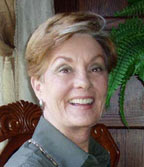 WOMEN’S HISTORY MONTH GUEST POST: With 1st-wave feminism on my mind this morning, I’m thrilled to bring you a guest post that connects current goings-on to the past, by May Sinclair PhD, author of Infamous Eve: A History. May asks, “Are Clinton and Obama giving us an opportunity to re-live a version of the events that surrounded the 14th and 15th Amendments?” A California Real Estate Broker, May earned her doctorate in the Philosophy of Metaphysics soon after her 50th birthday. She’s an award-winning author, has written extensively about ancient disciplines connected with symbolism, and teaches private workshops on Dream Interpretation and Analysis from a Jungian perspective. She is someone I seriously hope to meet in real space one day! May blogs at My Thoughts on History. Here she is! – GWP
WOMEN’S HISTORY MONTH GUEST POST: With 1st-wave feminism on my mind this morning, I’m thrilled to bring you a guest post that connects current goings-on to the past, by May Sinclair PhD, author of Infamous Eve: A History. May asks, “Are Clinton and Obama giving us an opportunity to re-live a version of the events that surrounded the 14th and 15th Amendments?” A California Real Estate Broker, May earned her doctorate in the Philosophy of Metaphysics soon after her 50th birthday. She’s an award-winning author, has written extensively about ancient disciplines connected with symbolism, and teaches private workshops on Dream Interpretation and Analysis from a Jungian perspective. She is someone I seriously hope to meet in real space one day! May blogs at My Thoughts on History. Here she is! – GWP
Back to the Future?
Is the grand Universe offering us an opportunity to deal with a lesson in our history not previously understood? Are we re-living a version of the events that surrounded the ratification of United States Constitution’s 14th and 15th Amendments? Those events greatly concerned and involved two of our most important historical figures. Elizabeth Cady Stanton is the woman responsible for initiating women rights in this country and Frederick Douglass, who was born into slavery, is a major figure in the effort to release the United States of America from the horrors of slavery. They worked closely together, but in July, 1868 they had to face the fact that their primary objective of freedom for all did not survive when the legislators of the day banned together to block the powerful union of women and black people to only offer males the vote.
The 14th amendment said: “The right of citizens of the United States to vote shall not be denied or abridged by the United States or by any state on account of race, color, or previous condition of servitude.” The idea was to make sure freed slaves were not prevented from voting, but it only gave franchise to males rather than all citizens.
But then the Supreme Court case of Minor vs. Happersett allowed the individual states to determine which males got to vote anyway.
The cause of the amendments failure:
-1. The rights of women were not included.
-1. The Federal government did not prevent the individual states from initiating voter qualification laws like literacy tests and pole taxes.
Are we being beguiled into allowing the seemingly towering objective of gaining the highest office in the land by either a black man or a woman to deflect away from the primary objective and divide us so that no one really gains anything and those of us in this country who love it and care about equality are again torn apart in an attempt to undermine the power women and blacks exhibit together?
May Sinclair can be reached at infamouseve@msn.com.
Susan Bee and Mira Schor, along with Emma Bee Bernstein (Susan’s daughter!), Carolee Schneemann, and Brynna Tucker will be on a March 30th Panel, 3:00 – 5:00 PM: “Beyond the Waves; Feminist Artists Talk Across Generations” at The Sackler Center for Feminist Art at the Brooklyn Museum. It’s free & open to the public (with museum entry fee).









